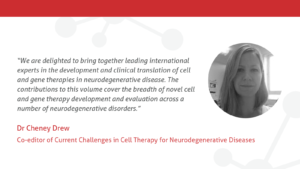How far have we come with cell and gene therapies?
BRAIN researchers have co-edited a book which examines the progress of cell therapies in the treatment of neurodegenerative diseases, published last November.
Cell therapies are a promising development for the treatment of neurodegenerative diseases (NDDs) such as Huntington’s and Parkinson’s, which occur when nerve cells in the brain or the nervous system stop working or die.
The symptoms of NDDs are varied and can range from memory loss and mood disorder to mobility issues. Existing medicines for NDDs aim to minimise some of these symptoms but are unable to treat the root causes of the disease itself.
New therapies such as Advanced Therapeutic Medicinal Products (ATMPs) are a new and personalised alternative to treating NDDs. Unlike existing medicines, ATMPs aim to treat the direct cause of disease whereby cells, protein, or DNA is extracted from a patient before they are altered and then re injected.
The BRAIN Unit, based at Cardiff University is examining the effects of ATMPs in a series of clinical trials. Clinical trials enable researchers to test the effectiveness of a new treatment and ensure it is safe enough to use on a wider scale.
The new book, ‘Current Challenges in Cell Therapy for Neurodegenerative Diseases’ is co-edited by three of BRAIN’s researchers: Emma Lane, Mariah Lelos and Cheney Drew and was commissioned as part of the International Review of Neurodegenerative Diseases. The book examines the progress of such ATMPs, as well as some of the challenges of translating these therapies into a clinical setting.
As well as editing the volume, Lane, Lelos and Drew also contributed chapters to the book, aligned with their current areas of research. This includes the development of stem cell therapies for Parkinson’s and Huntington’s disease and how those are investigated with the use of animal models, how we can evaluate ATMPs in clinical trials and the importance of including the patient voice in the development and testing of new treatments.

Cheney Drew said, “We are delighted to bring together leading international experts in the development and clinical translation of cell and gene therapies in neurodegenerative disease. The contributions to this volume cover the breadth of novel cell and gene therapy development and evaluation across a number of neurodegenerative disorders.”
‘Current Challenges in Cell Therapy for Neurodegenerative Diseases’ is available to purchase in hard cover or ebook format.



